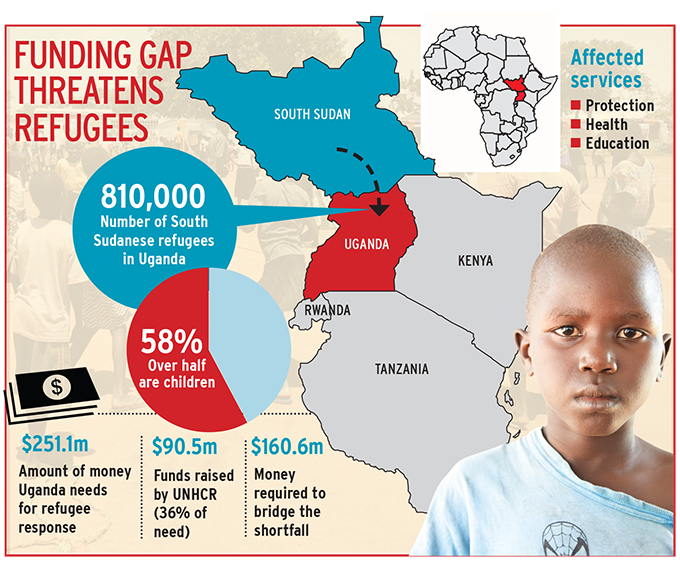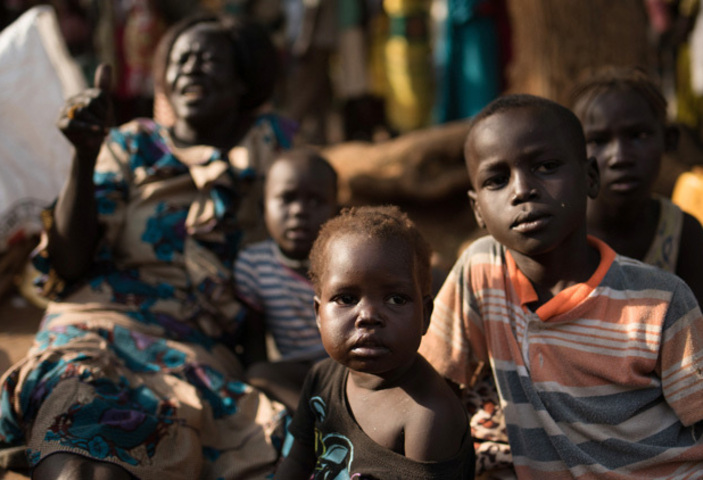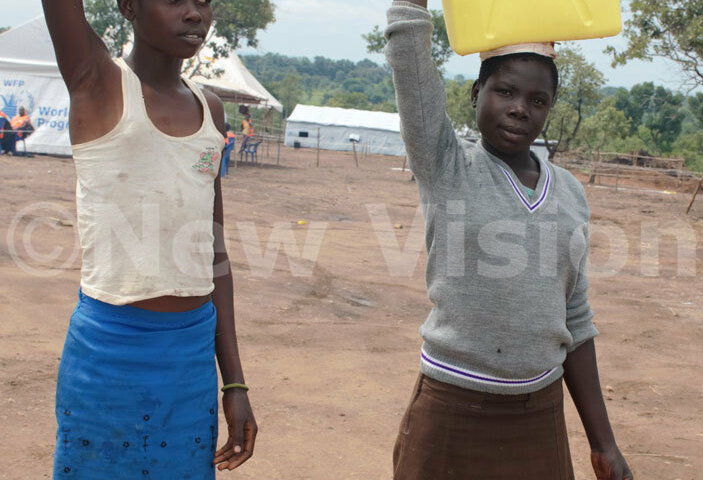Uganda, UNHCR appeal over refugees surge
Uganda currently hosts more than 800,000 South Sudanese refugees, 572,000 new arrivals who have continued to stream into the country in desperate need of safety and help since 8 July 2016.
The Government and United Nations High Commissioner for Refugees (UNHCR) have appealed to the international community for urgent and massive support for thousands of South Sudan refugees who continue to pour in the country, fleeing brutal conflict back at home, coupled with lack of food.
The joint appeal was made by the Prime Minister of Uganda Dr. Ruhakana Rugunda and the UN High Commissioner for Refugees Filippo Grandi, noting that the influx of refugees is placing a huge strain on resources, presenting a big challenge.
"Uganda has continued to maintain open borders but this unprecedented mass influx is placing enormous strain on our public services and local infrastructure. We continue to welcome our neighbours in their time of need but we urgently need the international community to assist as the situation is becoming increasingly critical," Rugunda said.
"We are at breaking point. Uganda cannot handle Africa's largest refugee crisis alone," Grandi said, adding that, "The lack of international attention to the suffering of the South Sudanese people is failing some of the most vulnerable people in the world when they most desperately need our help."

Uganda currently hosts more than 800,000 South Sudanese refugees, 572,000 new arrivals who have continued to stream into the country in desperate need of safety and help since 8 July 2016.
There are projections that the population of South Sudan refugees in Uganda is likely to rise above one million by mid this year, given that more than 172,000 of them have fled into Uganda since the beginning of the year. In March alone, there have more than 2800 new arrivals.
However chronic and severe underfunding has reached a point where critical life-saving help risks becoming dangerously compromised with transit and reception facilities rapidly becoming overwhelmed.
Major challenges are being faced in providing refugees with adequate food rations, health and educational services, and sufficient clean water; a dire situation further compounded by heavy rains.
Currently, UNHCR urgently needs more than a quarter of a billion USD to support South Sudanese refugees in Uganda.
Children's situation
Another statement on the current state of children in the refugee camps, released by Save the Children shows that many of the children are malnourished and have malaria, diarrhea and respiratory infections.
"Our biggest concern right now is that the underfunding of the response means that children, who comprise more than half of the total population (469,800), do not have access to adequate protection from abuse, health, nutrition, and education services in the settlements," said Save the Children Uganda Country Director Brechtje van Lith.

Similarly, out of 36,900 children of primary school-going age in Bidibidi settlement-Yumbe district, which hosts the largest number of South Sudanese refugees, only 52% (19,188) have access to education.
Van Lith said many of the children come to Uganda on their own, having been separated from or lost their parents during flight. However Bidibidi, the largest camp hosting South Sudanese refugees in Uganda, has 4,638 unaccompanied and separated children registered.
"These children often get lured into marriage, child labour to meet survival needs, as well as face exposure to sexual and physical abuse, particularly while under the care of adults other than their parents/guardians," Van Lith added.
Speaking at the 5th Human Rights Defenders (HRD) annual forum in Kampala on Friday last week, Beatrice Abaru, an HRD working with People Living with AIDS Network, an NGO in Yumbe district said a total of 10 cases of children within the community being defiled by adult refugees had been reported to police since January this year.
"Some of the refugees refuse to move to the camps and end up defiling children in the community. Many of the culprits are those that lost their spouses in the war," she said. By press time, Abubaker Musiho the DPC Yumbe district was not available to ascertain the claim.

The forum organised by the Human Rights Centre Uganda was aimed at establishing effective strategies in addressing the current issues embedded in the working environment of HRDs in Uganda.
Uganda has been hailed for its approach to dealing with refugees considered to be among the most progressive anywhere on the African continent.
Upon receiving refugee status, refugees are provided with small areas of land in settlements integrated within the local host community; a pioneering approach that enhances social cohesion and allows both refugees and host communities to live together peacefully.
In mid and South-West Uganda, land for these settlements is provided by Government. In Northern Uganda, where the vast majority of South Sudanese refugees are being hosted, the land has been donated by the local host community.
As a result Uganda was chosen as a role model for pioneering a comprehensive approach to refugee protection that complements humanitarian responses with targeted development action, benefiting both refugees and the communities hosting them. This was adopted as part of the New York Declaration on Refugees and Migrants at the UN General Assembly last year, and is now also being rolled out in other displacement crises - offering hope to millions of refugees worldwide.
However, with the current underfunding and the fastest-growing refugee emergency in the world, Uganda's ability to realise a model that allows refugees to thrive now risks being jeopardized.